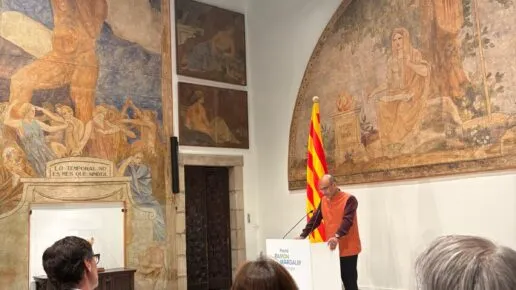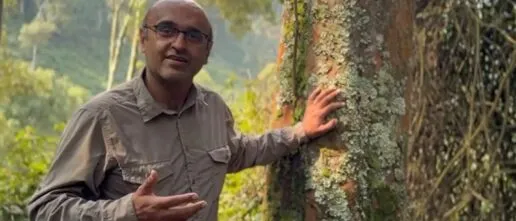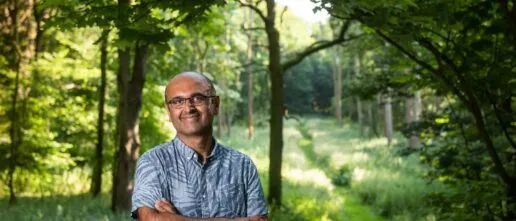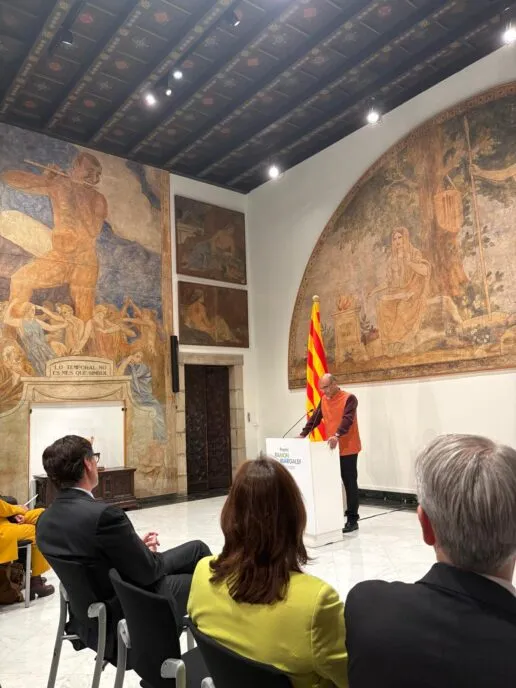Thank you. Gràcies.
I am deeply honoured and genuinely humbled to receive the Ramon Margalef Prize.
My heartfelt thanks to the Generalitat de Catalunya for this recognition, to the Jury of the Ramon Margalef Prize for their generosity and trust, and to all who help keep alive the spirit of this unique and remarkable award, and keep alive the profound legacy of Ramon Margalef.
It is also wonderful to see this award as a signal of the strong support of the Catalan government for ecological science — and to know that the President himself is deeply committed to using science and evidence as foundations for a sustainable future for Catalonia.
That commitment sends a powerful signal, not only to scientists, but to societies everywhere: that knowledge, when guided by humility and imagination, can help us shape a flourishing world.
I have long known Ramon Margalef’s name as a father figure of modern ecology. But it was only after learning that I would receive this prize that I began to read his work in depth. And what I found was a treasure trove — pages filled with insight, imagination, and wisdom that were, in so many ways, ahead of their time.
Margalef didn’t just study ecosystems; he reimagined them.
He saw the living world not as a collection of isolated species, but as a network of flows and relationships — of energy and information, interacting and evolving through time.
In that sense, he helped establish ecology as perhaps the first true systems science — a science that seeks to understand how complexity, organisation, and life itself emerge from interaction.
That vision could not be more relevant today.
We live in a world of accelerating change — ecological, social, and technological. And yet, beneath all that change, the same fundamental laws hold: that life energy drives transformation, and information gives it pattern and meaning.
Margalef understood this beautifully.
He saw ecosystems as entities that, over time, accumulate both information and organisation. As energy flows through a system — from sunlight to plant, from herbivore to predator, from decay back to soil — new structures emerge, and with them, new forms of order. Life, he suggested, is a process by which the universe gathers and refines information through the continual cycling of energy.
One thing that was striking in his writing was his insight into ecological disturbance. Margalef recognised that disturbance is not only a force of destruction — it is also a source of renewal.
When an ecosystem is disrupted — by fire, by flood, by storm — it creates space for vitality and regeneration, for new combinations of species, for new ecological structures to emerge. Disorder, in his view, was not the opposite of life, but one of its essential motors.
And of course, here in Catalonia, that insight could not feel more immediate. On Tuesday I had a wonderful visit to local landscapes and scientific experiments, and got an appreciation of the ecological challenges facing Catalonia, and indeed the entire Mediterranean region.
The challenge of managing landscapes and fire in the context of climate change reminds us that disturbance is both a danger and an opportunity — one that demands deep ecological understanding and strong, sustained scientific support. Science can help us read the signals of the landscape, anticipate thresholds, and guide management in ways that protect both people and ecosystems. This is precisely the kind of systems thinking that Margalef championed: seeing the links between energy, vegetation, water, and human activity as parts of one dynamic whole.
That idea feels profoundly important for our time. Because we, too, are living through an age of disturbance — planetary in scale, and human in origin. Yet Margalef’s work reminds us that disturbance, though painful, can also be creative. It can open the door to transformation — to new patterns of coexistence, new ways of living within the limits of the Earth. The question is whether we can guide that transformation wisely, with humility and imagination.
The challenge before us, then, is not merely how to live sustainably — as if sustainability were about minimising damage — but how to live in ways that allow both people and the rest of life on Earth to flourish together. That means seeing humanity not as separate from nature, but as a child of nature, as part of its dynamic fabric — as participants in the same flow of energy and information that sustains all living systems.
The science of ecology sits at the heart of this challenge. It gives us a framework for understanding how natural and human systems intertwine — how complexity and diversity emerge, how feedbacks operate, how resilience arises, and how change propagates through networks of connection. It also reminds us that complexity can be a source of strength, that diversity underpins stability, and that cooperation is as natural as competition. In an age of loud voices that seek to narrow our vision of who we are and who we can be as a society, these lessons are as much social and political as they are ecological.
For me, discovering Margalef’s work at this moment has been both intellectually exhilarating and deeply personal. He combined the precision of a scientist with the sensibility of a philosopher and the imagination of a poet.
He wrote with wonder as much as with rigour, always searching for the underlying order — the logic of life that runs through chaos and complexity alike. And he never lost sight of hope. He believed that even in disturbance, even in disorder, there lies the potential for renewal. That ecosystems — and perhaps societies, too — can reconfigure themselves into new, more adaptive forms. It’s a vision that sees resilience not as resistance to change, but as the ability to dance with it.
So as I accept this award, I do so with enormous gratitude — to the Generalitat de Catalunya, to the Jury of the Ramon Margalef Prize, to my fellow ecologists here and around the world whose work continually inspires me, and above all, to Ramon Margalef himself, whose ideas continue to illuminate the path ahead. He showed us that our role, as scientists and as citizens, is not only to study those flows, but to live wisely within the flows of nature.
If we can do that — if we can align our systems of knowledge, economy, and society with the deeper logic of the living world — then we might yet find, even amid disturbance, the seeds of renewal. We might rediscover, as Margalef did, that complexity is not a problem to be solved, but a source of beauty, vitality, and endless possibility.
As Margalef once wrote, «L’ecologia demana que mirem la natura una i altra vegada amb ulls d’infant.» Ecology, he said, asks us to look at nature again and again with a child’s eyes.
If we can keep those eyes open — curious, humble, and full of wonder — then perhaps we can learn, once more, how to live well within the living Earth.
Gràcies.

Related News Articles

Professor Yadvinder Malhi, Leverhulme Centre for Nature Recovery Director, awarded Ramon Margalef Prize in Ecology

Yadvinder Malhi awarded prestigious Ramon Margalef Prize in Ecology
Leverhulme Centre for Nature Recovery Director, recognised for outstanding contribution to the field of Ecology.
